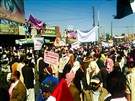On Friday, the whole world was abuzz about what was happening in Turkey and whether there was a coup underway. A few short hours later, President Erdogan, ironically using the same methods he had denounced for years when used against him, beseeched his supporters to “Go to the streets and give them your answer!” And that is exactly what they did. Thousands of AKP supporters poured into the street to block the army tanks and soldiers. A crowd marched to the airport to welcome Erdogan back in Istanbul. The coup had failed and Erdogan was ready with his mandate to speed up his quest for unlimited power and purge the military, "purify" the government ministries, and uproot some opposition groups (such as the Gulen movement). While the coup was an attempt to undermine an elected government, the President`s wide-reaching retaliation now includes tens of thousands within Turkey`s judiciary, universities, and other civilian bureaucracy with potentially grave consequences for the country`s democracy.
According to the BBC, the toll since Friday’s failed coup has been:
· Nearly nine thousand police officers have been sacked
· Close to three thousand judges have been suspended
· Some 1,500 employees of Turkey`s finance ministry have been dismissed
· 492 have been fired from the Religious Affairs Directorate
· Turkey`s higher education council has banned academics from leaving the country.
· Twenty-one thousand teachers at private institutions had their licenses revoked.
Since Friday, Erdogan has been flirting with the idea of bringing back the death penalty and vowed to reconstruct the historic Taksim military barracks in Istanbul’s Gezi Park (the site of mass protests in 2013). His project also extends to knocking down the Ataturk Cultural Centre to build an opera house and large mosque near Taksim Square.
VOMENA’s Shahram Aghamir spoke with Turkish political scientist Istanbul-based Dr. Osman Shahin about the coup, counter-coup, and the repressive political environment in Turkey in the aftermath of Friday’s events.
![[Photo by Eser Karadag from Flickr]](https://kms.jadaliyya.com/Images/357x383xo/istanbul_0.jpg)









